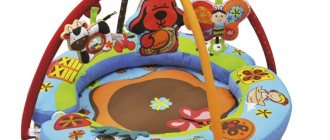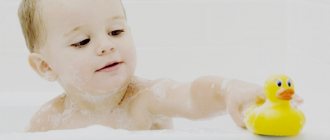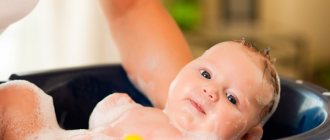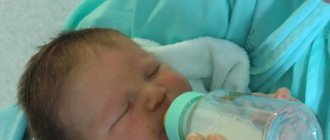Features of choosing sleeping pills for children
Calming a child who is fussy, refuses to go to sleep, or stays awake outside of school hours does not necessarily require a prescription for a limited-sale medication.
But you definitely need medical advice and recommendations made in accordance with age and existing pathology. For each age category, there are drugs of choice that are certified and have undergone multiple clinical trials. Up to a year, medicinal-type sleeping pills are clearly recommended for encephalopathy and hydrocephalus. There are no other indications for use. Restless and problem children are given milk formula with tryptophan. Soothing herbal infusions are recommended, and even then, they are often limited to linden, chamomile, mint, lemon balm and motherwort, which are given in the form of chilled tea or added to a bath prepared for bathing.
Industrial teas are undoubtedly more convenient to use, and parents usually prefer them. Among the recommended and affordable ones you can look at:
- "Granny's Lukoshko";
- "Evening Tale";
- "Hipp"
- “Bai-bai Tea”;
- "Bebivita";
- "Calm-Ka";
- "Humana"
- “The power of Russian herbs”;
- "Nervoflux tea";
- "Phytosedan";
- "Sweet dreams";
Some of them can be given to a baby from 2-4 months. Tea “Linden blossom with lemon balm”, from the famous one, for example, is indicated for consumption from 4 months of age. And this is not the only successful development. In this list there are several medicinal teas with a sedative effect, which are used at different ages and are made for certain periods of the baby’s development.
Sleeping pills Pantogam and Phenibut come in tablets, capsules and syrup, but until the age of three, only syrup can be given. In fact, it is not a sleeping pill in the traditional sense, but a mild sedative that optimizes blood circulation in the brain and thereby improves sleep quality.
Persen, consisting of extracts of valerian, lemon balm and mint, can be given to children from the age of five, after consulting with a doctor about the optimal dosage, and adult Tenoten, which is supposed to be a drug with a similar effect, should not be given to children. Children under 5 years of age and a little older can be used recipes of traditional medicine and prepare medicinal mixtures, or purchase ready-made ones at the pharmacy.
In folk therapy for sleep disorders, valerian, mixtures of valerian root extracts, hop cones, lemon balm, licorice root, and orange flowers are often used. The composition of the drug called “Novopassit” is approximately the same, in which the manufacturer claims dry extract of medicinal valerian, medicinal lemon balm, St. John's wort, hawthorn, passionflower (passionflower), hop fruit, and black elderberry flowers. Such fees can be used up to 10 years and older, having first checked for allergic reactions and consulted with a neurologist about the permissible dosage.
When using traditional medicine, it should be remembered that the effectiveness of their use largely depends on the condition of the internal organs. And especially from the healthy functionality of the digestive and nervous systems. Therefore, medications of this type should be combined with eating healthy foods, following a diet and medicinal baths before the expected time of sleep.
Effective homeopathic remedies based on natural ingredients have also been developed for children with insomnia. Their use requires compliance with certain conditions, careful dosing and compliance with the instructions:
- Baby gray not only normalizes sleep, but also copes with tearfulness and irritability.
- Notta has been approved for a year now and has an undeniable hypnotic effect.
- Dormikind dietary supplement will help even at a very early age.
- The effective Hare is available in the form of marmalade drops.
- Naughty is prescribed from the age of 6.
- Edas 306 is considered possible to be given to infants
- Valerianahel is used from 2-3 years of age.
- Nervohel, Sedalia Leovit have proven themselves well and have virtually no contraindications.
Dietary supplements, which are the basis of homeopathic remedies, do not directly affect sleep, but introduce into the body substances necessary to regulate vital processes.
Any sleeping pill with a sedative effect should be prescribed only after all possible means have already been tried. Long-term and incorrect use can lead to pathologies of the nervous system and slower physiological growth of the child. A doctor's advice in such matters is vital.
How to choose for a child?
Before choosing a drug, you must consult a doctor, even if it is a herbal medicine, you need to minimize the risks of developing allergic reactions in a child.
At this age, there can only be two reasons for taking real sleeping pills: hydrocephalus of the baby’s brain or postnatal encephalopathy. These are serious diseases for which self-medication is inappropriate.
Most often, herbal infusions are recommended for restless babies under one year of age to normalize sleep. Mint, motherwort, and lemon balm have a mild effect. They can be drunk as tea or added to the bath in which the baby bathes. Infants are often given a decoction of ordinary chamomile.
At this age, a child has good reasons for not sleeping: colic, wet diapers, uncomfortable diapers, hunger. Therefore, parents should look for what the root of the baby’s problems is and eliminate negative factors. Sleep will improve even without medications.
For very restless babies, there is a milk formula with tryptophan (an amino acid that regulates sleep and wakefulness) on sale. It's called "Frisolak". It can be given from birth to six months.
If your 6-month-old baby and older child have a doctor who has discovered disturbances in the functioning of the nervous system, he may prescribe Pantogam. This is a mild sedative that improves blood flow to the brain. It comes in tablets, syrup and capsules. The tablet form should not be taken by children under three years of age.
A children's single dose of Pantogam starts at 0.25 grams, the daily dose is a maximum of 3 grams. Depending on the diagnosis, the course of treatment will last from 1 to several months.
In the next video, a young mother will tell you why a child in the first year of life may not sleep well and what your actions should be.
For older toddlers (2-5 years old), in addition to homeopathic and herbal remedies, the doctor may prescribe Phenibut. This is a nootropic drug that has a mild tranquilizer effect. This medicine improves blood circulation in the central nervous system and improves the activity of brain cells.
The pediatric dose of this drug is from 20 to 100 mg per day. Treatment will last up to 4 weeks. A doctor may also recommend Phenibut for enuresis in a child and for the treatment of certain forms of stuttering.
Magnesium preparations, for example, Magne B6, also normalize sleep, but you should not give them to a child without a doctor’s recommendation. If the doctor, based on the results of the child’s tests, comes to the conclusion that there is not enough magnesium in the small body, he will certainly offer you this particular drug. Magnesium improves the functioning of cells throughout the body, including the nervous system. Improves sleep, appetite, reduces anxiety.
The instructions for Magna B6 say that the children's dosage is 1-6 tablets per day. The amount does not depend on age, as many mothers think, but on the degree of magnesium deficiency in the body. That's why it's better to get tested first.
Homeopathic sedatives
Traditional medicine is skeptical about homeopathic sedatives, but parents often choose such medications for overexcited, nervous babies. In this case, consulting a doctor is still necessary, since not all products are recommended for children and are suitable without exceptions or contraindications. Homeopathic remedies contain plant components.
The following are very popular:
| Product name | Compound | Action | Indications | Mode of application | Price, rubles |
| Naughty in the form of granules | Staphysagria, C200+ Wormwood, C200+ pharmaceutical Chamomile, | Normalizes sleep, calms the nervous system | Age over five years | 5 granules half an hour before meals once a day, preferably in the evening. The course is one month. | |
| Note – drops, tablets | Sowing oats, chamomile, phosphorus, coffee tree, zinc valerinate. The excipient in the drops is ethanol; for tablets – potato starch, lactose monohydrate, magnesium stearate | Eliminates sleep disorders, helps with increased nervous excitability | Age of at least three years for drops, for tablets - at least twelve years. | From 3 to 12 years - five drops three times a day, from 12 children - 10 drops or one tablet. Therapy lasts 1-4 months | 240 – tablets 413 – drops |
| Baby gray | Bryonia, Chamomilla, Staphysagria | Calms an overexcited nervous system and promotes rapid sleep | Age over seven years | Dissolve 5 granules in the morning 15 minutes before meals for two weeks | |
| Valerianahel | humulus lupulus, crategus, hypericum perforatum, lemon balm officinalis, camomilla recutita, avena sativa, picrinicum acidum, kalium bromatum, ammonium bromatum, natrium bromatum, ethanol | Helps with neuroses, sleep disturbances, increased excitability, neurasthenia. | Contraindicated under two years of age | Children under six years old – 5 drops 3 times a day; up to 12 years – 10 drops. | |
| Leovit | Motherwort, hawthorn, coriander, valerian, nutmeg, lemon balm, sugar, starch, oats, calcium stearate, PVP. | The sedative has restorative and calming effects. | Age over 12 years | 1-3 tablets three times a day with meals | |
| Magnesia | Magnesium sulfate | Calms the nervous system | Age less than three years | One tablespoon of powder three times a day before meals | |
| Kindinorm | Chamomilla, valerian, cuprum, Kalium phosphoricum, staphysagria, Calcium hypophosphorum | Reduces increased excitability, improves concentration | Less than one year old | Three times a day before or after meals, half an hour later | |
| Dietary supplement Hare | Magnesium lactate, vitamin B6, dried thyme extract, chamomile, fennel fruit, lemon balm leaves, oregano, peppermint, vitamin C, fruit syrup (sugar, apple-cherry juice). | Indicated for stress, neurasthenia, calms and relaxes | Age over three years | 1-2 tea boats three times a day with meals |
Calming a newborn quickly according to Komarovsky’s recommendations
During the first days of life, it is common for a baby to be capricious and cry. In this way he expresses his concern to his parents. But often this phenomenon causes anxiety and parents do not know how to calm their newborn baby.
At first glance, this is simple to do, because it is enough to find out the cause of the whims and try to eliminate it. Babies cry mainly due to hunger, intestinal colic, pain and lack of attention.
Each irritating factor has its own methods of calming, which we will discuss in this article.
How to calm a newborn baby when he cries? Advice from E. Komarovsky
First, try to guess the reason for the child’s whims. After a month, parents independently begin to understand what exactly the baby wants, since the child’s character has been more or less studied. Let's take an interest in what the famous pediatrician Evgeny Komarovsky recommends for each individual case.
- If a child is hungry, he must be fed. When a child is breastfed, he can be offered the breast instantly, which cannot be said about artificial nutrition. Therefore, Komarovsky advises that infant formula be prepared before the baby begins to act up. In this situation, there is no other way to quickly calm a newborn baby.
- It is not uncommon for a baby to wet their diapers or nappies. The feeling of moisture brings discomfort to the baby. Therefore, the most correct advice is to replace wet clothes with dry ones. It is important to ensure that the baby does not freeze. If the room is warm, give your child an air bath between changing clothes. 10-15 minutes are enough for this.
- The baby's movements are constrained, while he is uncomfortable and scared, then the child begins to sound the alarm by crying and whims. Carefully inspect the newborn's clothes; perhaps something is pressing on him. If you practice swaddling, wrap your baby in a new way and do it more loosely.
- The baby wants to sleep. Babies in the newborn period cannot fall asleep on their own, so they get nervous and sometimes cry hysterically. In this case, the question arises of how to calm a newborn baby before bed. E. Komarovsky advises taking the baby in your arms, singing a lullaby, and talking calmly. The ideal thing is to offer the breast and then the baby will fall asleep peacefully.
- If a child suffers from intestinal colic or cramps in the tummy, there are special pain relievers for this. These include Espumisan, Riabal, Bobotik, Infacol. When choosing medications, you need to rely on the recommendations of your pediatrician, since not all medications are equally suitable for infants.
Attention! There are other reasons that worry the baby. Most often these are feelings of pain and discomfort; if the child cries hysterically and attempts to calm them down are not effective, contact your pediatrician.
We recommend watching a video on how to calm a newborn when he cries.
Hysteria in a baby: the main reasons
Often the cause of hysterical crying in a newborn baby is simple anxiety when the mother is not around. If you believe ancient sayings, people believed that a child’s severe hysteria meant that he had been jinxed. Against such phenomena, conspiracies were used, reading prayers, and washing the baby with holy water.
Children say! By the age of three, Verochka realized that the world was divided into female and male halves, and began to pester me with the question: “Mom, are you even a girl?”
When a baby is often hysterical, perhaps something serious is bothering him; unfortunately, such crying becomes the first symptom of a pathology of the gastrointestinal tract or circulatory system, which was not detected at birth. It is completely useless to calm the child in such situations by feeding, changing clothes and rocking.
Important! If you observe such symptoms, be sure to show your child to the doctor.
We calm and put the child to sleep in a short time
There are many options for how you can calm a newborn and help him fall asleep quickly, but each method works individually:
- try singing a lullaby to your child, despite the fact that this is the technique of our grandmothers, nevertheless it is quite effective. Don’t despair if your newborn’s song doesn’t suit you, you may have to choose a special melody for him;
- brisk walking or vibrating movements calm even the most restless babies;
- motion sickness is considered the most accessible method. You can rock your baby in your arms, in a cradle, or in a stroller;
- don't know how to calm a newborn? If all else fails, try giving Nurofen. This drug effectively relieves attacks of pain and lowers body temperature. Indicated for children from three months.
For parents! Experienced mothers have proven that there is an effective way to calm a newborn in 2-5 minutes. Active movements of parents during motion sickness successfully help in this matter.
Harvey Karp Method: 5 Basic Steps
A unique way to calm a newborn baby was invented by the American doctor Harvey Karp. This technique consists of 5 main steps, taking into account which you will be able to quickly calm a crying baby.
Children say! The little one (5 years old) found my old doll and asked: “Did she have tick-borne encephalitis?”
To implement this technique, you will need to create an atmosphere similar to that of the child before birth. Here are a few steps to take to quickly calm your newborn:
- tight swaddling - this is done first. Keep in mind that the baby should not move his arms;
- place the baby on its tummy or side in your arms;
- hissing and making noise. To do this, you can turn on the radio with a broken wave. The characteristic hissing is reminiscent of the sounds that the baby heard while in the womb;
- Rock your baby with calm movements reminiscent of waves. As a rule, the child feels calmer this way;
- The sucking reflex perfectly calms the baby. Offer your baby the breast or hand a pacifier.
Such tips will incredibly quickly help rid your newborn of hysterics and screams in a short time.
Watch a video clip from Harvey Karp about the rules of calming infants
Source: https://dearmummy.ru/kak-uspokoit-novorozhdennogo-rebenka-za-5-minut-bystrye-i-effektivnye-metodiki.html
What sleeping pills are prescribed for children
Different medications are usually prescribed for different age groups. The most commonly prescribed for infants are:
- Phenibut is a nootropic drug;
- Dormikind is a German mild homeopathic remedy;
- Magne B6, which replenishes magnesium deficiency;
- pantogam syrup
Children under 3 years old grow very quickly. Sleep disorders at this age can be triggered by a lack of calcium in the body or teething. The most popular sleeping pills for this age group are:
- viburkol – from one year;
- glycine – from one year;
- kindinorm - from one year.
Children over three years old already have more adult problems associated with adaptation to kindergarten or school, excessive physical activity and stress. Sleep disturbances often appear during age-related crises, which include the 3-year-old crisis, the 7-year-old crisis, and the puberty crisis. At this age, sedatives are already prescribed for a course of up to 2 weeks. Usually at this age they prescribe:
- Pantogam tablets – from three years;
- atomoxetine – from 5 years;
- sanosan – from 6 years;
- Alora – from 7 years;
- Persen capsules – from 12 years.
Homeopathic remedies
Quite often, children at any age are prescribed homeopathic remedies. You can buy them in pharmacies without a prescription, but this does not mean that you can do without consulting a doctor. A child may develop an individual reaction to each drug, so you can start giving the drug only with minimal doses. :
- Bayu-bai - drops containing extracts of hawthorn, peony, and motherwort. The drug can be given to children as young as one year old.
- Kaprizulya capsules – for children over one year old.
- Tenoten tablets are a mild homeopathic sedative prescribed for children over three years of age.
- Persen syrup contains mint and lemon balm extracts. valerian. Appointed from the age of three.
- Nott's drops are prescribed to overly excitable children over two years of age.
- Hare syrup – contains cumin, chamomile, hawthorn, valerian, vitamins. Prescribed for children over three years of age.
- Baby-sed are homeopathic granules that are prescribed to children over 7 years old for easier adaptation to school.
Before you start giving your child sleeping pills, you should find the root cause of poor sleep and try to solve the problem in other ways. The use of any sleeping pills is fraught with unpleasant consequences:
- the emergence of addiction;
- negative manifestations the day after administration: lethargy, apathy, loss of appetite;
- disturbance of the alternation of sleep phases.
Traditionally, according to the active component, all sleeping pills are divided into 3 groups:
- Bromine-containing.
- Barbiturates.
- Antihistamines.
Antihistamines and bromine-containing medications can lead to disturbances in sleep architecture. Barbiturates are highly addictive. A baby, with his immature nervous system, may suffer from the prescription of sleeping pills even in minimal dosages.
Sleeping pills, like any medicine, can cause side effects:
- constipation;
- drying of mucous membranes;
- headache;
- nausea, vomiting;
- weakness.
You should not give children who have trouble sleeping such popular antihistamines as suprastin and tavegil. Despite the fact that drowsiness appears after taking these medications, sleep disorders are not among the indications for these medications. The next day after taking antihistamines, severe drowsiness, lethargy, and often even headache are observed.
List of used literature:
- Levin Ya. I., Kovrov G. V. Some modern approaches to the treatment of insomnia // Attending physician. - 2003. - No. 4.
- Kotova O. V., Ryabokon I. V. Modern aspects of insomnia therapy // Attending physician. - 2013. - No. 5.
- T. I. Ivanova, Z. A. Kirillova, L. Ya. Rabichev. Insomnia (treatment and prevention). - M.: Medgiz, 1960. - 37 p.
Poor sleep in a child or disruption of sleep phases is a fairly common problem. This condition can be triggered by various factors - both internal and external.
For newborns and children under 2-3 years of age, there are many sedatives, cereals, and infant formulas. But what should parents do if these methods are not enough? How to help an older child? When is it necessary to take sedatives and hypnotics? Let's take a closer look.
Causes of sleep disorders
Unlike the device in an adult, a child’s central nervous system reacts differently to external and internal stimuli, and the specifics of such a reaction depend on the age period. The concept of normal specified in medical manuals may differ in one direction or another when considering an individual baby.
Because the state of his nervous system is determined by many factors - from the course of the birth process to past illnesses in the anamnesis. A consultation with a neurologist or psychologist will help determine the actual need for drug correction of sleep and select a drug or remedy that is appropriate for the child’s condition and age.
Dyssomnia (sleep disorder) is diagnosed in every tenth adult and is divided into two categories: insomnia (insomnia) and hypersomnia (excessive sleepiness). There are plenty of reasons for the occurrence of such a sleep disorder in adult life.
The causes of childhood insomnia can also be listed in many ways, but the most typical are the following:
- Under the age of one year (infancy) - an incorrectly formed stereotype of falling asleep and physiological reasons (hunger, diseases of the digestive organs, temperature changes, diaper rash, teething);
- From 1 to 5 years – absence of a certain frequency of sleep and wakefulness, night fears (parasomnia), nervous disorders, somatic diseases, emotional overload, individual developmental characteristics. At this age, it is acceptable to use a mild sedative for children.
- Preschool and school age are characterized by age-related changes and a decrease in the need for sleep. A sleep disorder can appear for physiological reasons common to childhood or become a consequence of certain diseases - otitis media, congenital and hereditary developmental abnormalities, infectious and colds.
- Adolescence is a period of rapid growth of the body, hormonal changes, and the formation of the reproductive system. A sleep disorder can be a consequence of ongoing changes, or manifest itself in any form characteristic of childhood.
In cases where the cause of insomnia is the lack of a formed pattern of falling asleep, hypoxia or hunger, it is better to make do with simple means at hand, i.e. love, affection and patience.
Sleep disturbances can be caused by psychological and physiological reasons:
- If the child is naturally a “little sleeper.” In this case, frequent awakenings may be a feature of the baby’s character and temperament.
- If the child has age-related psychological difficulties. He began to have scary dreams due to the active development of his imagination; he has age-related crises (3 years, 7 years, adolescence)
- If there is a difficult atmosphere in the family, quarrels, conflicts, or the child has experienced severe stress.
- If the child is in pain. Sleeping pills will not have any effect in this case.
In these cases, the child does not need sedatives (hypnotics). He will benefit from the help of a psychologist, confidential communication with parents, and play therapy. In case of pain, you need to consult a doctor and treat the cause, not the effect.
Sleep disorders in children and adolescents can also have other origins:
- Shallow, restless sleep, awakening accompanied by shrill crying. These signs may indicate damage to the child's nervous system.
- Night shudders are a very warning sign. This may be the first “bell” in the event of the onset of epilepsy. The child urgently requires examination.
- Somnambulism. Or as we call it, sleepwalking. This is a sleep disorder that is painful in nature. The child can walk, talk, do something without waking up.
- Bedwetting – enuresis. A wet bed does not promote sound sleep for a child.
- Sleep apnea. The child breathes unevenly during sleep, sometimes breathing is interrupted.
- Sleep phase disorder syndromes. This is a “failure” of the child’s internal clock. He may be sleepy during the day and awake at night. In infants, the biological clock is restored independently or with the help of parents. And in older children, sleep phase disorder syndromes may also require drug treatment.
Experts identify an incredible variety of reasons for lack of sleep in a young child. Factors that provoke this problem become the basis for choosing one drug or another. In addition, there can be several reasons at the same time, and they can be grouped: age-related, psychological, somatic, physiological. The most typical ones should be highlighted:
- improperly formed sleep mechanism;
- disturbance of periods of sleep and wakefulness;
- uncomfortable conditions: high humidity or dryness in the room, heat, uncomfortable clothing or bedding;
- physiological needs: hunger, the occurrence of diaper rash, the period of active teething;
- manifestation of symptoms of any disease (hyperthermia, pain, fever, various allergic reactions);
- age-related changes: formation of the digestive system, hormonal changes during puberty;
- psychological problems: overexcitement during the day, night fears, nervous disorders, emotional overstrain, stress and a painful atmosphere in the family.
The child's body is sensitive to changes of an internal and external nature. The response to an irritating factor is often a restless, interrupted night's sleep. Common causes of insomnia in children are:
- daytime hyperactivity;
- outdoor games in the evenings;
- stuffiness in the bedroom;
- uncomfortable bed;
- colds and chronic diseases;
- nervous excitement;
- enuresis;
- sleepwalking;
- moving to another apartment;
- conflicts with peers;
- quarrels between parents and an anxious situation in the family;
- biological clock failure.
Sometimes anxiety and sleep problems can occur due to an allergic reaction, accumulation of gas in the abdomen, stomatitis or rickets.
Sedatives for babies
Simple safe remedies can be used independently, as they do not cause side effects.
Warm bath
Taking a bath with soothing mixtures helps the newborn to relax and relieve increased muscle tone. Water vapor with natural relaxants additionally acts through the respiratory tract. For infants, decoctions of the following plants are added to the bath:
- lavender;
- calendula;
- chamomile;
- peony;
- valerian;
- fennel;
- thyme;
- mint;
- pine needle extract;
- motherwort.
The recommended bath time is 5-7 minutes, frequency 2-3 times a week.
Lullaby
The voice of a mother humming a quiet, gentle song calms babies better than medicine. Lullabies can be without words; it is enough for a child to simply hear his favorite voice.
Quiet music calms the nervous system of infants. Parents often use "white noise" - a chaotic combination of sounds of different frequencies that imitate the noises that the baby heard in the mother's womb.
Special tea
For infants, herbal teas containing herbs with a sedative effect are used. For infants, you need to select herbs that are considered safe for infancy. Ready-made teas for children under one year old contain sets of phytocomponents in strict accordance with recommended safe dosages.
If a neurologist has diagnosed a baby with postnatal encephalopathy, if the child is too restless (sleeps little, screams a lot) and has no other diseases that could interfere with his life, you should listen to the neurologist’s recommendations regarding sedatives.
For intracranial hypertension:
- As a rule, most infants with intracranial hypertension come to a balanced state of mind already from banal diuretics.
- In parallel with them, the child may be recommended a mixture with citral, which is prepared in pharmacies according to a prescription from a neurologist. The composition of the drug includes:
- magnesium sulfate, which lowers pressure in the head, has a calming and mild hypnotic effect
- valerian, which inhibits the nervous system.
sedative sodium bromide
It is necessary to strictly follow the recommended dosages, as valerian can slow down the heart rate. Valerian prevents the destruction of substances in the brain that block inhibitory processes. It calms, enhances the effect of sleeping pills, and relieves intestinal spasms.
Breastfeeding mothers can be recommended soothing teas and infusions sold in pharmacies (provided that they do not cause allergies in the little one). The same soothing teas are also available in baby food departments for children themselves.
When bathing babies, you can add tincture of valerian or motherwort to the water (40 drops per baby bath), not forgetting that alcohol solutions are not recommended even for external use in children. Decoctions of chamomile, lemon balm or peppermint also relax children. The herb St. John's wort is also recommended.
- Bath with oregano, motherwort, valerian and thyme - take 3 tbsp. spoons of a mixture of these herbs, brew, let stand for half an hour, strain and pour into the bath, the duration of the procedure is 15 minutes.
- A soothing pine bath is an excellent way to relieve a baby’s agitation, but take it no more than 5 minutes and no more than 12 baths per course.
- A bath with sea salt is also very calming and is recommended even for newborn babies. You can bathe your child for up to 30 minutes by dissolving 250 mg in the bath. sea salt.
| This is a more serious sedative, often prescribed to infants up to one year of age (although the instructions indicate a contraindication for children up to 2 years of age). It relieves anxiety, irritability and fear, causes drowsiness, relieves increased muscle tone and excessive motor activity in children. However, it has side effects such as excessive drowsiness, allergic reactions, headaches, kidney and liver dysfunction. |
Pantogam
The nootropic drug Pantogam (hopantenic acid) is often prescribed. It not only improves nutrition of damaged areas of the cortex, but also removes increased muscle tone, smoothes out obsessive motor activity, helps with movement disorders and delayed psychomotor development. True, today it refers to drugs with unproven effects, since extensive randomized studies have not been conducted on the drug (extensive practical experience of use in pediatric neurology does not count, since the manufacturer did not spend money on clinical studies). |
Indications for use
Sedatives for children are divided into preparations of valerian and other herbal preparations (Valocordin, tinctures of Peony, Motherwort, Corvalol), bromides (potassium and sodium bromide, bromcamphor), as well as preparations that contain chemical elements of other groups (for example, sedatives , which contain magnesium).
Diseases for which sedatives are prescribed:
- increased excitability of the nervous system;
- tachycardia (rapid heartbeat);
- hysteria;
- decreased appetite;
- spasms of the gastrointestinal tract;
- insomnia;
- migraine (headache);
- angina pectoris (sudden pain in the chest);
- asthenia (a state of general weakness of the body);
- early stages of hypertension (a disease characterized by high blood pressure);
- seasickness;
- vegetative-vascular dystonia (this is not a disease, but a set of symptoms due to disorders of the autonomic nervous system);
- neuroses of the cardiovascular system;
- neurasthenia (a disorder of the nervous system, expressed in attacks of headache, excessive irritability and sensitivity, anxiety, fatigue, absent-mindedness, memory impairment);
- for allergic reactions (in rare cases).
Sedatives for children should not be purchased without medical reasons. The main indications for use are increased irritability, uncontrollable emotions, sleep disturbances, significant headaches, and other nervous system disorders.
In newborns and infants, signs of high nervous excitability include severe anxiety, crying and screaming for no obvious reason, and refusal to eat. In older children, a neurosis-like state is manifested by anxiety, emotional lability, neurocirculatory dystonia (headaches, blood pressure surges, fatigue) and attention deficit disorder.
Sedatives of both herbal and synthetic origin are usually well tolerated by patients of any age. Contraindications for use are individual hypersensitivity and intolerance to the drug or its components, and in some cases, childhood.
The decision to prescribe sedatives should be made by the doctor, taking into account all individual diseases and the child’s health condition. Reasons for taking sedative medications may include:
- pronounced anxiety of the baby;
- screaming and crying for no obvious reason (subject to the exclusion of pain);
- refusal to feed;
- moodiness, tearfulness;
- effects of stress;
- nervousness.
Drops
- "Bay-bye."
The product helps to lift the child's mood and improve sleep. It contains extracts of peony, hawthorn fruit, peppermint, motherwort and oregano. The drug can be taken from the age of five. Dosage – from five to ten drops three times a day. The course of treatment is a month.
“Bai-bai” costs about 160 rubles.
- Epam 1000.
These drops are also made from herbal extracts: valerian, Rhodiola rosea, motherwort, and propolis. The action of Epama 1000 is based on restoring the structure of nervous tissue. For depression and aggressive behavior, the remedy is very effective. The dosage is prescribed by the doctor.
The price of Epama 1000 is about 190 rubles.
Sedatives in childhood should be considered only as a necessary measure when clear signs of psychological imbalance are detected in the child.
There are many different medications that are not contraindicated in children, but their use should only be carried out as directed by a specialist
The child’s psyche is very vulnerable and unstable, and therefore maximum caution must be exercised in relation to it.
Excessive excitability and capriciousness that appears in children at any age can create a real stressful situation in the family. In addition to the fact that such trials are difficult for parents and people around them, the children themselves suffer quite a lot - sleep is disturbed, appetite worsens, irritability, headaches, and apathy appear. Children's imbalance affects relationships with friends, and schoolchildren lose enthusiasm for studying.
Of course, if an abnormal mental state appears in a child, you should not immediately stuff him with potent drugs. At the same time, the process cannot be left to chance. This condition can be a normal defensive reaction to external stimuli, but it can also become a symptom of pathology. Only a pediatrician can establish the causes of inappropriate behavior, with the involvement of a psychiatrist, if necessary.
At their core, sedatives or sedatives (psycholeptics) are a large group of drugs that, by acting on the central nervous system, reduce emotional stress. However, they, as a rule, do not have a hypnotic effect and belong to the category of weak psychotropic substances. They do not cause drowsiness, but increase the quality of natural sleep. Despite the mild nature of the impact, mental suppression is especially dangerous for a child. That is why the prescription of a sedative medication is made taking into account the age and severity of symptoms in a strictly controlled dosage and course duration. Long-term use of it leads to the nervous system becoming accustomed to outside help.
If a sedative is used, the age factor is of utmost importance for children. Newborns are very often capricious and wake up 3-4 times a night without a serious reason, and such increased excitability should be extinguished by the patience of parents and proper care. A sedative for children under one year of age is prescribed only for serious abnormalities, in particular postnatal encephalopathy or cerebral hydrocephalus.
At an older age (after 7 years), excessive excitability, even of a physiological nature (without connection with pathologies), can seriously affect the child’s communication abilities, which interferes with overall development and can lead to mental disorders. The list of indications for psycholeptics for schoolchildren is expanding significantly, and a psychotherapist is involved in treatment. The task is to eliminate irritability, aggressiveness, hysteria, insomnia, and excessive emotionality.
Symptoms for which you should consult a doctor
If you notice that your child’s behavior is different from the norm, you should contact a specialist for qualified help. Childhood neuroses can manifest themselves in various symptoms, for example:
- Attacks of fear;
- Nervous tics;
- Depressive neurosis;
- Hypochondria;
- Improved sleep quality;
- Eating disorders;
- Logoneurosis;
- Neurasthenia.
In such circumstances, when your child exhibits any of the symptoms, you should immediately seek medical help. In some cases, if you follow all the doctor’s recommendations, this goes away quickly, but sometimes it is necessary to resort to the help of medications.
Types of drugs
To regulate your sleep, your doctor may recommend:
- phytocollections;
- homeopathy;
- medicines from herbal ingredients.
These drugs have a small list of contraindications and rarely have side effects. Due to their safe composition, they can be easily purchased at a pharmacy without a prescription.
For infants
Newborns' biological clocks are not yet regulated, so they often wake up during the night and require their parents' attention.
Until six months, any sedative suspensions are prohibited. To normalize sleep, children can be given herbal infusions with the permission of a doctor.
Suitable for preparing medicine:
- chamomile flowers;
- motherwort;
- valerian root.
You need to pour a teaspoon of raw material with 250 ml of boiling water. Leave for 15 minutes and filter. Take 3 tablespoons 3 times a day.
Advertising:
Evening bathing with the addition of an infusion of soothing herbs is beneficial for newborns. You need to take a spoonful of chamomile and lavender and brew it in a liter of boiling water. After half an hour, strain and pour into a bathtub. Dilute the infusion with warm water and immerse the baby for 10 minutes.
When the child is six months old, the pediatrician can prescribe Pantogam. This is a herbal syrup that calms the nervous system. To improve sleep for babies up to one year old, many mothers purchase an adapted formula with the addition of tryptophan.
For children under 5 years old
The list of sleeping pills for children is gradually expanding. Phenibut is highly effective. The suspension improves blood circulation and nervous system function. The drug is in demand not only for the treatment of sleep disorders, but also for nocturnal enuresis.
It is made in the prescription department of a pharmacy as prescribed by a pediatrician. The medicine must be kept in the refrigerator and used within 10 days. The composition of the mixture varies depending on the age of the baby. The constant component is citral. Auxiliary ingredients may include:
- extracts of valerian root and motherwort;
- glucose;
- diphenhydramine;
- magnesium sulfate.
Children under 10 years old and older
Preschoolers and elementary school students are helped by the drug Magne B6. The tablets increase appetite, stabilize the function of the nervous system and heal the body. The dosage is determined individually based on test results.
You can restore restful sleep by:
- Persen;
- Bye-bye;
- Nervochel;
- Leovit.
It restores metabolic processes, increases physical activity during the day and helps you fall asleep quickly in the evening.
Herbal collections
You can buy ready-made soothing herbal mixtures at the pharmacy. They are made specifically for children, quickly strengthen sleep, improve mood, reduce excitability and intracranial pressure.
Children's sedative tea is very popular. It contains valerian root, licorice, birch leaves and other natural ingredients. The herbal mixture can be used as a sleeping pill for children at any age.
For easily excitable children, herbal teas are recommended:
- Nervoflux;
- Mom's fairy tale;
- Hipp;
- Calm-Ka;
- The power of Russian herbs.
Homeopathy remedies
Homeopathy is widely used to restore the nervous system and treat insomnia.
Before use, you need to take into account that long-term therapy with such compounds can cause addiction and worsen the child’s condition. To avoid complications, taking homeopathic remedies should be done with the permission of a doctor and under his supervision.
The herbal drug Dormikind is characterized by increased safety, therefore it is allowed for use in infants. It can be used to soothe your baby during teething and colds.
Starting from the age of three, the following may be used:
- Tenotena;
- Notts;
- Baby gray;
- syrup Bunny.
Anti-anxiety medications
- To calm the child's nervous system, Viburkol suppositories are suitable. This is a mild homeopathic remedy that reduces pain, nervousness, and prevents hysterics. The drug is approved from the first days of life. The dosage and duration of treatment is determined by the pediatrician.
- To regulate the biological clock and normalize sleep phases, Kindinorm is recommended. The medicine contains valerian extract, calcium, cuprum and other trace elements that have a beneficial effect on the central nervous system.
- From 6 years old you can use Sanason. These are tablets based on an extract of hop cones and valerian. They should be drunk once a day 2 hours before bedtime.
- Alora syrup with passionflower extract can be taken from the age of seven. The tableted drug is approved from 12 years of age.
On the road
Sometimes parents are looking for a way to help their child calmly survive a long journey or a long plane flight. Since travel is a one-time event, not daily, there is no need to take medications, even homeopathic ones. But you can use “Children's sedative No. 23” tea. It contains the roots of valerian, dandelion, mint leaves, walnut, plantain, hawthorn, cumin, rose hips, oregano, St. John's wort and many other useful plants.
If your child has trouble sleeping at night, but is healthy and full of energy, you can try playing pleasant soothing music before bed, which is presented in the video below.
How to improve your sleep and get enough sleep, Dr. Komarovsky tells in his program.











